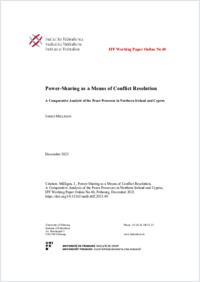Power-Sharing as a Means of Conflict Resolution : A Comparative Analysis of the Peace Processes in Northern Ireland and Cyprus
BFD
- Fribourg : IFF, 2023
English
Historical ethnic cleavages transpiring into periods of intense violence and political disarray are features that characterise both Northern Ireland and Cyprus in their recent history. Many similarities about the conflicts in both countries can be observed, yet Northern Ireland has been successful at securing peace and Cyprus has not. This paper aims to explain why this has been the case and if it could be possible for Cyprus to reach an agreement in the future. The approaches used in both countries concerning power-sharing are addressed and a considerable focus is applied to the theory of power-sharing known as consociationalism. The main conclusion taken from the study is that the peace process in Cyprus has been a long and arduous development, that whilst many will consider as a failure, has been successful in agreeing on a framework for the institutional makeup of the country through a bi-zonal and bi-communal federation. The next step for Cyprus is to overcome the external contextual factors holding back a peace agreement and this paper argues that the approach taken in Northern Ireland could be used to influence future negotiations.
- Collections
- Faculty
- Faculté de droit
- Department
- Institut du Fédéralisme
- Language
-
- English
- Classification
- Law, jurisprudence
- Series statement
-
- IFF Working Paper Online ; 40
- License
- Open access status
- diamond
- Identifiers
-
- DOI 10.51363/unifr.diff.2023.40
- ISSN 2813-5261
- Persistent URL
- https://folia.unifr.ch/unifr/documents/326943
Statistics
Document views: 467
File downloads:
- 40_James Milligan: 538
